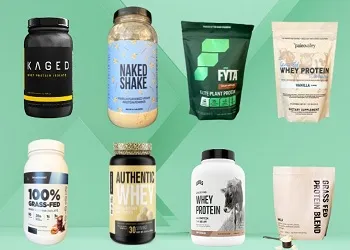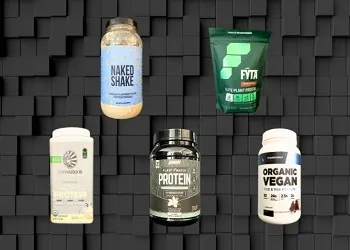As a parent-to-be or a new parent, you want to do everything you can to help your precious baby and prevent anything bad happening to them.
If you are conscious about your diet and supplement regimen, you’re likely curious about how that has to shift and change in these new phases of life.
While some research suggests there may be benefits to pregnant and lactating individuals and their babies, there isn’t substantial, reliable, convincing research to support its use.
In this article, we dive into the research that exists on glutamine during pregnancy and lactation, the safety of taking glutamine during these phases of life, and the official recommendations for each so you can decide what is best for you and your baby.
Table of Contents
Short Summary
- Glutamine is one of the nonessential amino acids that becomes a conditionally essential amino acid during pregnancy and lactation.
- Current research conducted on animals suggests there may be some benefits to taking the amino acid glutamine during pregnancy and lactation.
- Experts do not recommend taking glutamine during pregnancy and breastfeeding unless the benefits outweigh the risks. This recommendation is based on the lack of conclusive, human data on glutamine during pregnancy and lactation.

What is L-Glutamine?
Glutamine is a nonessential amino acid that likely becomes conditionally essential during pregnancy and lactation due to higher glutamine requirements from increased protein synthesis and elevated glutamine metabolism during these times.
While glutamine is considered a nonessential amino acid, meaning it is one of the amino acids derived from other compounds within our bodies, it is extremely important for many processes in the human body. Additionally, glutamine is the most abundant amino acid found in our bodies.
Glutamine has two forms: L-glutamine and D-glutamine. L-glutamine is the form of glutamine found in our food and supplements.
Benefits of Glutamine
Consuming glutamine-rich foods is important to ensure we have enough of this amino acid. Glutamine is necessary for multiple body systems and processes.
Digestive health, specifically intestinal health and intestinal function, is greatly dependent on having adequate glutamine. Optimal growth and development, including cell growth and fetal growth, is also reliant on adequate glutamine content. Additionally, immune function, immune responses, and overall immune system health require glutamine. Finally, glutamine is an important acid for lean body mass, including skeletal muscle mass.
Where Do You Get Glutamine?
Glutamine is found in many foods with a high amino acid composition. In general, it is fairly easy to consume enough glutamine and other amino acids from food sources including:
- Fish and seafood
- Milk and dairy
- Meat
- Eggs
- Beans
- Tofu
- Dark, leafy greens
- Red cabbage
- Nuts and seeds
L-glutamine supplementation is also available for individuals who are not getting enough glutamine through food. You can also consume glutamine through dietary supplements including protein supplements like whey protein powder or amino acid supplements.
Glutamine for Pregnancy and Breastfeeding
Before we dive in here, it is important to note that while there is some research in this area, conducting research on pregnant and breastfeeding humans is not common so human data on this topic is very limited. The data that does exist is from animal research, which is accurate in humans sometimes, but not always.
More research in this area is needed to fully understand how glutamine and other amino acids may affect pregnancy and milk production. However, it’s important to acknowledge the ethical concerns of research during these times when a vulnerable baby is involved.
Potential Benefits of Glutamine for Pregnancy and Breastfeeding
Research supports the idea that glutamine is necessary for normal fetal growth and development.
Some data exists suggesting that during periods of pregnancy, lactation, and growth, glutamine becomes one of the conditionally essential amino acids instead of one of the nonessential amino acids.
This means that while our bodies are generally able to produce glutamine even if we aren’t consuming enough of it, the human body cannot keep up with its increased glutamine metabolism and protein synthesis during pregnancy and lactation, which leads to higher needs for glutamine during these times. Because of these increases, we need to consume extra dietary amino acids, specifically exogenous glutamine through our diet or supplements in order to have enough.
Other research showed that increased L-glutamine intake while breastfeeding increased the milk glutamine concentrations and decreased muscle loss in the lactating mother.

Can You Take L-Glutamine While Pregnant?
If there are potential benefits of dietary glutamine supplementation while pregnant, you may be wondering, can I take L-glutamine while pregnant? The general recommendation is no.
Is L-Glutamine Safe During Pregnancy?
While some animal studies seem to suggest there may be benefits to glutamine supplementation while pregnant, there are no controlled human studies to prove its safety.
Recommendations for Glutamine Supplementation During Pregnancy
The formal recommendation is that dietary glutamine supplementation should only be used during pregnancy when the benefits outweigh the risks. This is something that would be determined by your doctor. As always, discuss with your doctor or other healthcare professional about what is appropriate for you.
Based on current research, the safest bet is to avoid L-glutamine supplementation while pregnant.
However, consuming glutamine-rich foods to boost your glutamine intake is a great way to get more glutamine without the potential risks associated with supplements.

Can You Take L-Glutamine While Breastfeeding?
Similarly, with some studies pointing to potential benefits of glutamine supplements while breastfeeding, you may also be wondering, can I take L-glutamine while breastfeeding? Again, the recommendation is to avoid it in most cases.
Is L-Glutamine Safe While Breastfeeding?
At this point in time, there is no way to be sure glutamine supplementation is safe during breastfeeding. Some animal studies seem promising, but there is not adequate human data to accurately determine the potential risks for lactating women and their infants.
Recommendations For Oral Glutamine Supplementation During Breastfeeding
Once again, the recommendation is to weigh the potential risks and potential benefits of taking supplemental L-glutamine while breastfeeding. This should be done with your doctor or another healthcare provider who is familiar with you and your individual situation.
Current research suggests the safest bet is to avoid L-glutamine supplementation while breastfeeding.
Again, increasing your intake of glutamine-rich foods to boost your glutamine intake is a safe way to consume more glutamine to keep up with your increased glutamine needs, without the risks associated with taking supplements.
Does Glutamine Affect Birth Control?
At this point, there is also no research to support the idea that glutamine supplements and birth control interact in any notable way.

Summary
While some studies point to benefits including fetal growth and development during pregnancy and increased milk glutamine content during lactation, the research on glutamine supplements during these phases of life is limited. Additionally, all existing data is from animal studies without replication in human subjects.
Currently, experts do not recommend consuming supplemental glutamine during pregnancy or breastfeeding. The only time they may recommend it is if the potential benefits outweigh the potential risks. This is something that should absolutely be discussed in detail with your doctor or a healthcare provider who is familiar with you and your individual situation.
FAQs
Who should avoid glutamine?
Some experts suggest avoiding excess glutamine, specifically supplemental glutamine, if you suffer from psychiatric disorders or seizures. Additionally, some recommend reducing your intake if you are elderly and have kidney or liver disease.
As discussed above, pregnant and/or breastfeeding individuals should also avoid supplemental L-glutamine.
What supplements should I avoid while breastfeeding?
Many supplements are transferred to your baby through your breast milk. In most cases, it is best to avoid supplements that may be detrimental to your baby. Additionally, many health professionals recommend avoiding supplements that have not been thoroughly researched. When babies are involved, err on the side of caution.
Some supplements to avoid while breastfeeding include:
- Ashwagandha
- Berberine
- Echinacea
- Ginko biloba
- Quercetin
Additionally, as discussed above, avoiding glutamine and other amino acid supplements is recommended because of the lack of human research.
Does glutamine mess with hormones?
At this time, there is no substantial evidence that glutamine supplements disrupt hormones in any way.
Is it safe to take amino acids while pregnant?
In general, most healthcare professionals recommend focusing on protein-rich foods to ensure you are getting the amino acids you need instead of taking supplemental amino acids.
In most cases, there is not much reliable, human data on the use of supplemental amino acids during pregnancy. While there are clear benefits to getting enough glutamine and other amino acids while pregnant, getting them through protein-rich foods is a safer method than supplementation.
Why can’t you take dietary amino acids while pregnant?
As discussed above, the potential risks associated with supplemental amino acids generally outweigh the potential benefits associated with supplementing these amino acids.
With any supplement there is a risk of contamination in addition to potential side effects. If you are interested in increasing your intake of amino acids during pregnancy, focus on doing so by consuming protein-foods, which are low-risk and packed with amino acids.














